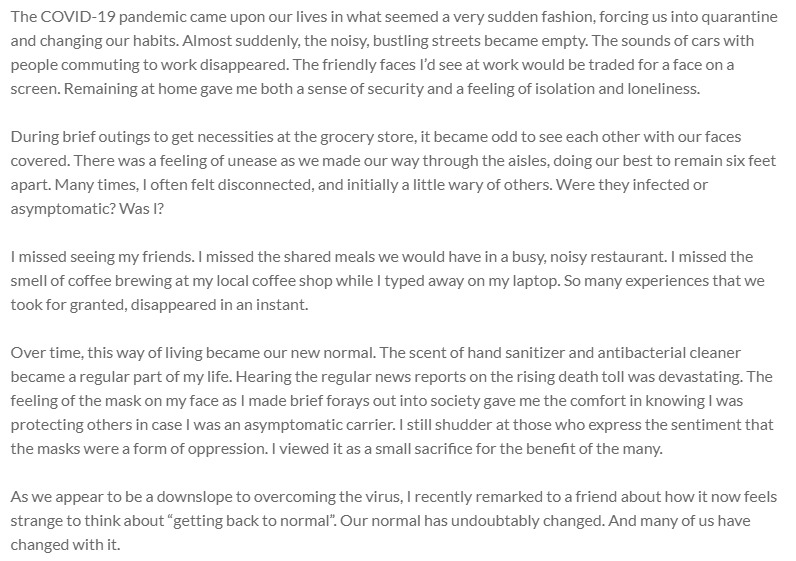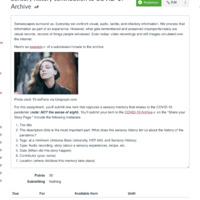Item
A New Normal
Title (Dublin Core)
A New Normal
Description (Dublin Core)
The COVID-19 pandemic came upon our lives in what seemed a very sudden fashion, forcing us into quarantine and changing our habits. Almost suddenly, the noisy, bustling streets became empty. The sounds of cars with people commuting to work disappeared. The friendly faces I’d see at work would be traded for a face on a screen. Remaining at home gave me both a sense of security and a feeling of isolation and loneliness.
During brief outings to get necessities at the grocery store, it became odd to see each other with our faces covered. There was a feeling of unease as we made our way through the aisles, doing our best to remain six feet apart. Many times, I often felt disconnected, and initially a little wary of others. Were they infected or asymptomatic? Was I?
I missed seeing my friends. I missed the shared meals we would have in a busy, noisy restaurant. I missed the smell of coffee brewing at my local coffee shop while I typed away on my laptop. So many experiences that we took for granted, disappeared in an instant.
Over time, this way of living became our new normal. The scent of hand sanitizer and antibacterial cleaner became a regular part of my life. Hearing the regular news reports on the rising death toll was devastating. The feeling of the mask on my face as I made brief forays out into society gave me the comfort in knowing I was protecting others in case I was an asymptomatic carrier. I still shudder at those who express the sentiment that the masks were a form of oppression. I viewed it as a small sacrifice for the benefit of the many.
As we appear to be a downslope to overcoming the virus, I recently remarked to a friend about how it now feels strange to think about “getting back to normal”. Our normal has undoubtably changed. And many of us have changed with it.
During brief outings to get necessities at the grocery store, it became odd to see each other with our faces covered. There was a feeling of unease as we made our way through the aisles, doing our best to remain six feet apart. Many times, I often felt disconnected, and initially a little wary of others. Were they infected or asymptomatic? Was I?
I missed seeing my friends. I missed the shared meals we would have in a busy, noisy restaurant. I missed the smell of coffee brewing at my local coffee shop while I typed away on my laptop. So many experiences that we took for granted, disappeared in an instant.
Over time, this way of living became our new normal. The scent of hand sanitizer and antibacterial cleaner became a regular part of my life. Hearing the regular news reports on the rising death toll was devastating. The feeling of the mask on my face as I made brief forays out into society gave me the comfort in knowing I was protecting others in case I was an asymptomatic carrier. I still shudder at those who express the sentiment that the masks were a form of oppression. I viewed it as a small sacrifice for the benefit of the many.
As we appear to be a downslope to overcoming the virus, I recently remarked to a friend about how it now feels strange to think about “getting back to normal”. Our normal has undoubtably changed. And many of us have changed with it.
Date (Dublin Core)
July 1, 2021
Creator (Dublin Core)
Dustin Hood
Contributor (Dublin Core)
Dustin Hood
Event Identifier (Dublin Core)
HST643
Partner (Dublin Core)
Arizona State University
Type (Dublin Core)
text story
Controlled Vocabulary (Dublin Core)
English
Emotion
English
Social Distance
Curator's Tags (Omeka Classic)
sound
sense
smell
isolation
mask
loneliness
security
Contributor's Tags (a true folksonomy) (Friend of a Friend)
ASU
sensory history
touch
smell
return to normal
Collection (Dublin Core)
Mental Health
Linked Data (Dublin Core)
Date Submitted (Dublin Core)
07/01/2021
Date Modified (Dublin Core)
07/10/2021
08/05/2021
Item sets
This item was submitted on July 1, 2021 by Dustin Hood using the form “Share Your Story” on the site “A Journal of the Plague Year”: http://mail.covid-19archive.org/s/archive
Click here to view the collected data.

